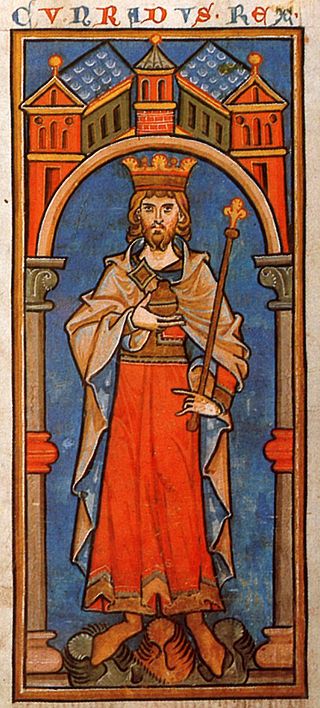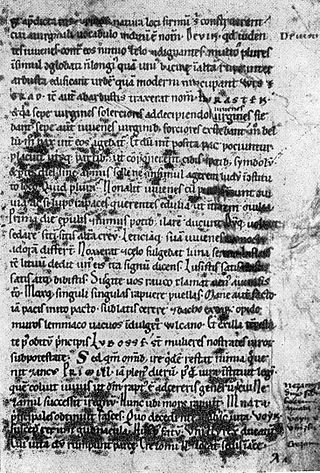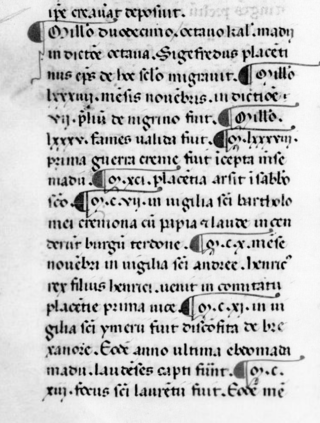Related Research Articles
Pope Stephen IX was the head of the Catholic Church and ruler of the Papal States from 3 August 1057 to his death in 29 March 1058. He was a member of the Ardenne-Verdun family, who ruled the Duchy of Lorraine, and started his ecclesiastical career as a canon in Liège. He was invited to Rome by Pope Leo IX, who made him chancellor in 1051 and one of three legates to Constantinople in 1054. The failure of their negotiations with Patriarch Michael I Cerularius of Constantinople and Archbishop Leo of Ohrid led to the permanent East–West Schism. He continued as chancellor to the next pope, Victor II, and was elected abbot of the Benedictine monastery of Montecassino.
Roger of Wendover, probably a native of Wendover in Buckinghamshire, was an English chronicler of the 13th century.

The Monumenta Germaniae Historica (MGH) is a comprehensive series of carefully edited and published primary sources, both chronicle and archival, for the study of Northwestern and Central European history from the end of the Roman Empire to 1500. Despite the name, the series covers important sources for the history of many countries besides Germany, since the Society for the Publication of Sources on Germanic Affairs of the Middle Ages has included documents from many other areas subjected to the influence of Germanic tribes or rulers. The editor from 1826 until 1874 was Georg Heinrich Pertz (1795–1876); in 1875 he was succeeded by Georg Waitz (1813–1886).
William of Newburgh or Newbury, also known as William Parvus, was a 12th-century English historian and Augustinian canon of Anglo-Saxon descent from Bridlington, East Riding of Yorkshire.

Ekkehard of Aura was the first Abbot of Aura from 1108. It is thought that Ekkehard was a member of the Bavarian aristocracy.
The Annales Sangallenses maiores are annals compiled in St Gallen, covering the years 927 through to 1059. They continue the Annales Alamannici, the St Gallen version of which reaches up to 926.

Sigebert of Gembloux was a medieval author, known mainly as a pro-Imperial historian of a universal chronicle, opposed to the expansive papacy of Gregory VII and Pascal II. Early in his life he became a monk in the Benedictine abbey of Gembloux.
Carl Erdmann was a German historian who specialized in medieval political and intellectual history. He is noted in particular for his study of the origins of the idea of crusading in medieval Latin Christendom, as well as his work on letter collections and correspondence among secular and ecclesiastical elites in the eleventh century. He is often mentioned alongside Percy Ernst Schramm and Ernst H. Kantorowicz as one of the most influential and important German scholars of medieval political culture in the twentieth century. His promising and remarkably prolific career was cut short by his death in the German army at the end of World War II. His grandson Martin Erdmann is a professor for experimental particle physics at the RWTH Aachen University.
Alberic of Trois-Fontaines was a medieval Cistercian chronicler who wrote in Latin. He was a monk of Trois-Fontaines Abbey in the diocese of Châlons-sur-Marne. He died after 1252. He wrote a chronicle describing world events from the Creation to the year 1241.
The Chronica Gallica of 452, also called the Gallic Chronicle of 452, is a Latin chronicle of Late Antiquity, presented in the form of annals, which continues that of Jerome. It was edited by Theodor Mommsen in the Monumenta Germaniae Historica as Chronica Gallica A. CCCCLII, along with another anonymous Gallic chronicle, the Chronica Gallica of 511.
Richard of Poitiers, also known as Richard of Cluny, was a monk of the Benedictine abbey of Cluny, and author of a small number of historical works, treatises and poems.

The Annales laureshamenses, also called Annals of Lorsch (AL), are a set of Reichsannalen that cover the years from 703 to 803, with a brief prologue. The annals begin where the "Chronica minora" of the Anglo-Saxon historian Bede leaves off—in the fifth year of the Emperor Tiberios III—and may have originally been composed as a continuation of Bede. The annals for the years up to 785 were written at the Abbey of Lorsch, but are dependent on earlier sources. Those for the years from 785 onward form an independent source and provide especially important coverage of the imperial coronation of Charlemagne in 800. The Annales laureshamenses have been translated into English.
The Auctarium Prosperi Havniense is an anonymous continuation of the Chronicle of Prosper of Aquitaine, embodied in a manuscript at Copenhagen ; it was given this appellation by Theodor Mommsen. Written in Latin in Italy, it covers the periods 455–457 and 473–625. It is an important source for the early Lombard kingdom.

The Chronica regia Coloniensis, also called the Annales Colonienses maximi, is an anonymous medieval Latin chronicle that covers the years 576 to 1202. The original chronicle only went up to 1197, but a continuator later added the following few years' events. According to the historian Manfred Groten, the Chronica was probably first compiled about 1177 in Michaelsberg Abbey, Siegburg, and then continued in Cologne. The earliest manuscript only contains an account down to 1175.

The Sächsische Weltchronik is a universal history written in German prose. It is not clear in which regional form of German the original was written. Of the twenty-four surviving manuscripts, ten are in Low German, nine in High German and five in Central German. These can be divided into three recensions, the earliest dated to 1229 and the latest to 1277.
Oda of Saxony was a Saxon princess. She was the daughter of Otto I, Duke of Saxony and Hedwiga of Babenberg. She married King Zwentibold of Lotharingia and at his death in August 900, she contracted a second marriage with Count Gerhard I of Metz. From this union were born:

The 1125 German royal election was the Imperial election which lasted from 24 August to 1 or 2 September 1125, following the death of Henry V. It resulted in the coronation of the Duke of Saxony Lothair of Supplinburg as the King of the Romans by the Archbishop of Mainz, Adalbert on 13 September in Aachen.

The Chronica Boemorum is the first Latin chronicle in which the history of the Czech lands has been consistently and relatively fully described. It was written in 1119–1125 by Cosmas of Prague.

The Guelph Annals of Piacenza is a Latin chronicle of Piacenza and Lombardy for the years 1031–1235, written by Giovanni Codagnello.

Luitpold was archbishop of Mainz from 1051 to 1059.
References
- ↑ The Uses of the Past in the Early Middle Ages, page 245, Yitzhak Hen, Matthew Innes, Cambridge University Press, 2000. ISBN 9780521639989